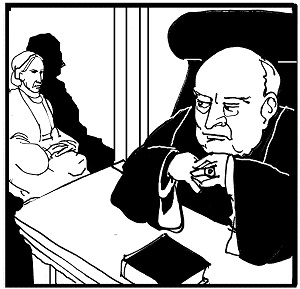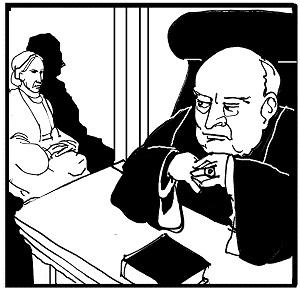

“Render a just decision for me…” (Luke 18:3).
Twenty-Ninth Sunday in Ordinary Time
Exod 17:8-13; Ps 121; 2 Tim 3:14-4:2; Luke 18:1-8
In the parable of the unjust judge and the widow, Jesus pits the most powerful figure in society against the weakest to show that persistence will out, especially in prayer.
The arrogance of the judge meets the prayer of the helpless widow and loses its power to intimidate and dismiss her. This is actually an unlikely outcome, but Jesus’ intent is clear. If a poor widow can get what she demands from an unjust judge, how much more will any applicant to a merciful God be listened to? Her prayer is not just for some benefit but for justice. Like the child asking her father for food, so a loving God cannot resist the cries of his children. Can the God of justice resist?
While Luke applies the parable of the widow and the judge to prayer, there is no mistaking the added and powerful social commentary about how widows and orphans were being treated, despite the Torah’s command that they, and alien residents, be cared for (Deut 6). The poor widow faced an impossible challenge just to be noticed by the corrupt judge, but in the end she forced him to render a ruling because she would not give up or go away.
This parable has immediate bearing on a contemporary church issue. Will Pope Francis complete his papacy without addressing the inequality of women in the Catholic church, one of the last bastions of male dominance among world institutions? If we are sympathetic to the pope's strategic goals, we might speculate that he has so far not pressed this issue because he knows that dramatic change must come from a larger and deeper call within the whole church.
A motu proprio, or executive papal decision to allow women deacons or open the question of the priesthood, could shift energy and focus away from the prize of his papacy— a genuinely synodal church. It is there that all such difficult questions must inevitably arise-- from within the universal church, generating the momentum to move them forward as the will of the Holy Spirit and the People of God.
We have a chance to watch this question play out this Sunday in the pope’s remarks on the parable of the widow and the unjust judge. Pope Francis seems especially attuned to the Word he preaches each day, often revealing his views on larger policy questions in his homilies. It is here that he so often invokes the power of the Holy Spirit to guide the church. As Francis calls us all to obey the Spirit, he is himself bound to that same obedience.
The parable of the widow and the unjust judge asks the guidance of the Spirit on the role and status of women. If we are paying attention, we may see a demonstration of the pope’s own encounter with the living Word and the Holy Spirit leading us inevitably toward a more perfect equality within a synodal church.
Jesus told the parable to affirm the power of persistent prayer. One issue where persistent prayer has been applied for centuries is the unjust treatment of women by the church. If this is not the will of the Holy Spirit, then change must come, and soon. Today’s Gospel ends with Jesus’ words that God’s will is to bring justice into the world. But Jesus also asks if we are ready to accept it? Do we have the faith to listen to the Spirit and act accordingly?
“I tell you, he will see to it that justice is done for them speedily.
But when the Son of Man comes, will he find faith on earth?" (Luke 18:8).
Advertisement







